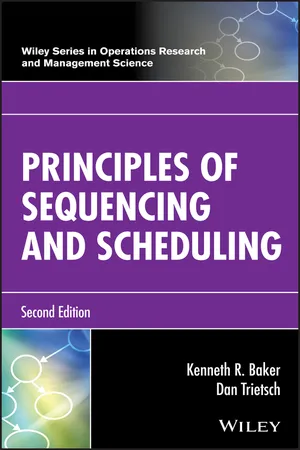
- English
- ePUB (mobile friendly)
- Available on iOS & Android
Principles of Sequencing and Scheduling
About this book
An updated edition of the text that explores the core topicsin scheduling theory
The second edition of Principles of Sequencing and Scheduling has been revised and updated to provide comprehensive coverage of sequencing and scheduling topics as well as emerging developments in the field. The text offers balanced coverage of deterministic models and stochastic models and includes new developments in safe scheduling and project scheduling, including coverage of project analytics. These new topics help bridge the gap between classical scheduling and actual practice. The authors—noted experts in the field—present a coherent and detailed introduction to the basic models, problems, and methods of scheduling theory.
This book offers an introduction and overview of sequencing and scheduling and covers such topics as single-machine and multi-machine models, deterministic and stochastic problem formulations, optimization and heuristic solution approaches, and generic and specialized software methods. This new edition adds coverage on topics of recent interest in shop scheduling and project scheduling. This important resource:
- Offers comprehensive coverage of deterministic models as well as recent approaches and developments for stochastic models
- Emphasizes the application of generic optimization software to basic sequencing problems and the use of spreadsheet-based optimization methods
- Includes updated coverage on safe scheduling, lognormal modeling, and job selection
- Provides basic coverage of robust scheduling as contrasted with safe scheduling
- Adds a new chapter on project analytics, which supports the PERT21 framework for project scheduling in a stochastic environment.
- Extends the coverage of PERT 21 to include hierarchical scheduling
- Provides end-of-chapter references and access to advanced Research Notes, to aid readers in the further exploration of advanced topics
Written for upper-undergraduate and graduate level courses covering such topics as scheduling theory and applications, project scheduling, and operations scheduling, the second edition of Principles of Sequencing and Scheduling is a resource that covers scheduling techniques and contains the most current research and emerging topics.
Frequently asked questions
- Essential is ideal for learners and professionals who enjoy exploring a wide range of subjects. Access the Essential Library with 800,000+ trusted titles and best-sellers across business, personal growth, and the humanities. Includes unlimited reading time and Standard Read Aloud voice.
- Complete: Perfect for advanced learners and researchers needing full, unrestricted access. Unlock 1.4M+ books across hundreds of subjects, including academic and specialized titles. The Complete Plan also includes advanced features like Premium Read Aloud and Research Assistant.
Please note we cannot support devices running on iOS 13 and Android 7 or earlier. Learn more about using the app.
Information
Table of contents
- Cover
- Table of Contents
- Preface
- 1 Introduction
- 2 Single‐machine Sequencing
- 3 Optimization Methods for the Single‐machine Problem
- 4 Heuristic Methods for the Single‐machine Problem
- 5 Earliness and Tardiness Costs
- 6 Sequencing for Stochastic Scheduling
- 7 Safe Scheduling
- 8 Extensions of the Basic Model
- 9 Parallel‐machine Models
- 10 Flow Shop Scheduling
- 11 Stochastic Flow Shop Scheduling
- 12 Lot Streaming Procedures for the Flow Shop
- 13 Scheduling Groups of Jobs
- 14 The Job Shop Problem
- 15 Simulation Models for the Dynamic Job Shop
- 16 Network Methods for Project Scheduling
- 17 Resource‐Constrained Project Scheduling
- 18 Project Analytics
- 19 PERT 21
- Appendix A: Practical Processing Time Distributions
- Appendix B: The Critical Ratio Rule
- Index
- End User License Agreement